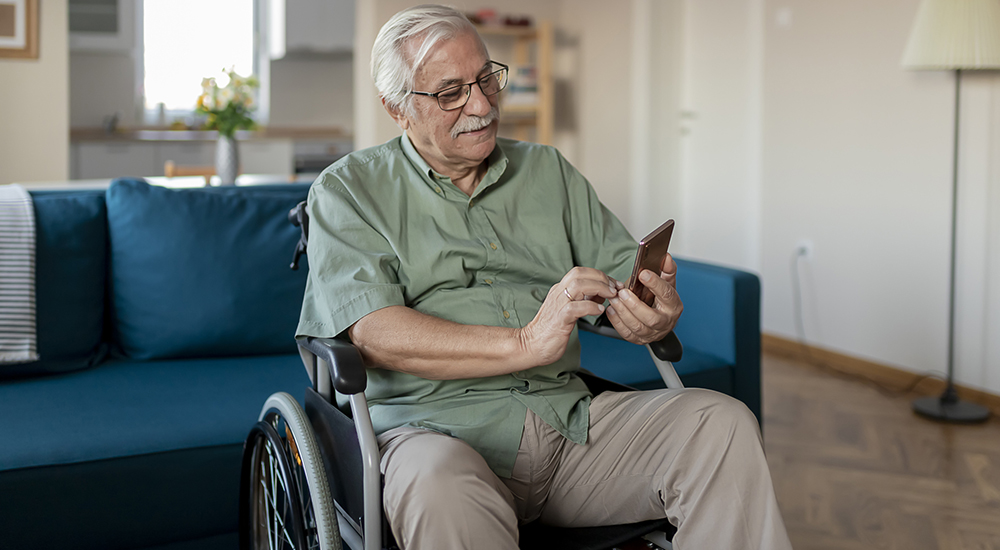Veterans with cancer who undergo aggressive therapies often endure adverse effects. The worst symptoms usually happen at home following chemotherapy or other treatment.
As a result, a team at the Minneapolis VA Medical Center in Minnesota enlisted the help of Annie – VA’s automated text messaging system. The intent is to provide these Veterans with increased support for symptom management.
“Patients know they are experiencing symptoms, but they don’t always know when it’s too much or how to react,” explains Connie Jaenicke, NP. Jaenicke is a nurse navigator in the Minneapolis hematology/oncology department.
“We worry about patients not seeking treatment for these symptoms early enough to avoid a hospitalization. As a result, this can worsen a patient’s quality of life unnecessarily and delay or preclude future chemotherapy.”
Two years ago, Minneapolis became one of the first VA locations to participate in a pilot program to test Annie. Around the same time, scientists published studies citing evidence that online self-management tools reduced cancer symptom distress and improved quality of life.
From idea to protocol to study
As the idea formed that Annie could be used similarly, a clinical team from the oncology department convened. The team included Jaenicke, clinical nurse specialist Kathleen Nelson, oncologists Drs. Mark Klein and Evan Mariash, registered nurse Bev Foss and physician assistant Kim Smith.
In addition, they enlisted Lara Carson, RN, and My HealtheVet coordinator; and Dan Greenwood, Veterans health education coordinator, to help map out a message protocol for symptom self-management.
Finally, the group and members of the Annie Connected Care team developed the protocol and recruited 15 Veterans to participate in an eight-month study.
The report was published in the August 2019 Supplemental Edition of Federal Practitioner. It is titled, “Use of Mobile Messaging System for Self-Management of Chemotherapy Symptoms in Patients with Advanced Cancer.”
Here’s how the study protocol worked
Annie sent Veterans text messages twice daily, Monday through Friday, asking them to rate a symptom using the following severity scale:
- Absent (0)
- Mild (1)
- Moderate (2)
- Severe (3)
- Disabling (4)

Front row, from left, are Connie Jaenicke, NP and hematology-oncology nurse navigator, and Lara Carson, RN, Annie program manager and MyHealtheVet coordinator; back row, from left, are Daniel Greenwood, dietitian and acting director of Veteran Education, and Beverly Foss, RN and hematology-oncology RN case manager.
Symptoms included nausea/vomiting, mouth sores, fatigue, trouble breathing, appetite, constipation, diarrhea, numbness/tingling and pain. In addition, Veterans could input a symptom if Annie hadn’t asked about it. Annie asked whether they had a fever or not.
When Veterans replied to a symptom inquiry, Annie sent an automated message response based on the severity scale:
- Offer positive affirmation that they were doing well (0)
- Give advice for home management (1)
- Refer them to an educational hyperlink (2)
- Ask them to call a direct number to the clinic (3)
- Instruct them to report directly to the emergency department (4)
The results and what’s next
None of the Veterans reported disabling symptoms. In addition, all replied with symptom ratings and received self-management guidance. In a follow-up participant survey, Veterans offered many positive responses. Equally important, none reported technology challenges. All said it was easy to do, and many felt empowered by the texted advice for symptom self-management.
“The most unanticipated response was how many Veterans said they felt validated when Annie said they were doing well,” Jaenicke says. “That’s a tribute to the messages Lara and Dan helped us craft, like ‘Good job’ and ‘Happy to hear you’re not experiencing nausea.’”
As a result, Annie is available for use at VA facilities nationwide. Developers have tested and approved a wide range of Annie message protocols to help Veterans with self-care. Along with an updated version of the oncology protocol, there are protocols for blood glucose monitoring, hypertension, medication reminders, weight management, anxiety and many others.
Carson also helped develop other Annie protocols. She explains, “As we move toward using technology more often, our hope is that it becomes just as important as prescribing a walker or medicine to help the patient at home.”
Treva Lutes is the communications director for the Office of Connected Care.
Topics in this story
More Stories
Study underscores important role COVID vaccination can have in protecting Veterans from infection and reducing long-term health consequences
Columbia VA’s robotic surgery teams completed their 800th robotic surgery and are on schedule to hit 1,000 by the end of the year.
In a decentralized clinical trial, Veterans can participate from their own homes or local VA instead of having to travel to a research site.








Marijuana helps pain, nausea, high blood pressure, etc.
When is the VA going to recognize that the cancers on the Camp Lejuene cancers will spread to other organs and parts or the body. I have almost all of the eligible ones but the VA sales that the spread from one and deny my claim on the rest?
I have stage 4 lung cancer so all my other problems were just dropped. I have a herniated disc in my back causing severe pain in my hip buttocks groin and leg but they wont treat it due to the cancer. Went to pain management and so far they have done nothing to help with the pain. If it were them with this pain I am sure they would find a way to help relieve it.
It’s wonderful that you’re helping people with chemo side effects but, I find myself wondering… When is the VA going to come up with an application to help Veterans deal with severe, chronic pain and disability that only exists because VA providers have consistently refused to find out what’s causing it and instead, snowed their patients with overwhelming doses of opiates and other equally damaging medications? Which then caused a myriad of other problems like Dry Mouth Syndrome, destroying ALL of ones teeth and then requiring painful surgeries to remove them and then place dental implants, chronic GI problems, etc…